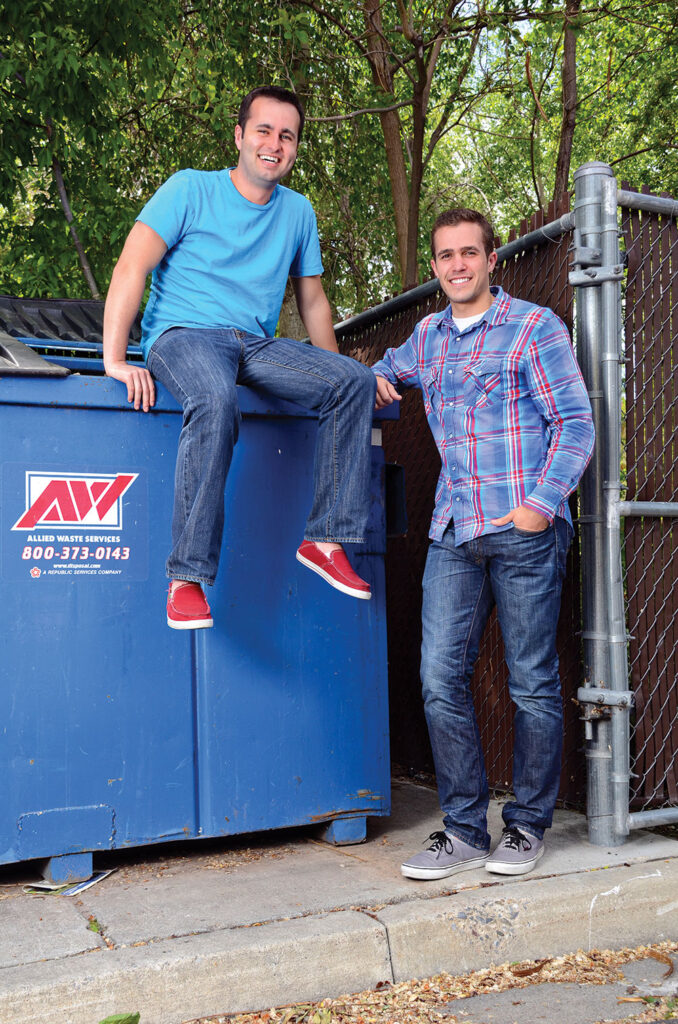
The all-you-can-eat french toast at Magleby’s Fresh is a powerful motivator. But inspiring a million-dollar business? That’s just delicious. “After gorging myself on the french toast, I went to throw my plate away, which still had a couple slices on it,” says Daniel Blake, founder of EcoScraps. “I was surprised at how wasteful I was being, and then I looked at the garbage and saw how wasteful everyone else had been before me.” Blake got curious (as all good entrepreneurs do) and started thinking about how to monetize food waste. Could he reorganize the garbage into raw materials? “In theory, if you don’t have to buy raw materials, your business margins would be pretty dang good,” Blake says. Dang straight. Today, three years after that fateful breakfast, Blake is turning food waste into nutrient-rich soil, selling his product throughout Utah, Arizona and Colorado, landing on the cover of Inc., winning multiple business competitions, and enriching the environment in the process. One man’s trash? An entrepreneur’s treasure.
After Magleby’s, I went back to my apartment and researched food waste in America. We spend billions of dollars a year in disposing our garbage, and 50 percent of all food we grow we end up throwing away. That’s 3 million tons of food waste, which is enough food to fill the Rose Bowl Stadium every three days. I’ve been to that stadium. It’s huge. I was blown away.
Growing up we had a garden in our backyard, so I was familiar with the gardening world. More and more people are wanting to grow organic, so I thought about tying it back into food waste. I knew food waste could actually be quite nutritious — and potentially make for some terrific soil. It was simply a matter of finding the right food waste and the right recipe. I’ve always been pretty adventurous and willing to try things other people aren’t. This was going to be fun.
So my partners and I went dumpster diving after dark and created a makeshift lab in our dorm parking lot. We also worked closely with the BYU soil lab, and they helped us run tests. Some foods made great compost — others were terrible. Through trial and error, we figured out that most fruits and vegetables made compost with nutrients just as high as MiracleGro.
We took our compost to the Highland Nursery and Linden Nursery. We showed them the product, and they loved it. So we put together a business plan.
I cold-called Costco while I was writing that business plan. The corporate office allowed us to do a pilot program, which meant Costco was one of our very first customers. Crazy. It gave us instant credibility.
I’ve always loved being outside. I’ve never considered myself an environmentalist. But most people, if it doesn’t cost them anything more, will do what benefits the environment. That’s the standard we’ve set ourselves to: Our business model doesn’t add costs, you don’t have to change your habits, and it’s convenient. We don’t charge retailers to dispose of their garbage, and the customer gets an awesome product that is slightly cheaper and better for the environment. Win-win.
My favorite moment was whenI walked into Home Depot and saw a bag of EcoScraps. I bought one! And I still have that receipt. Having started a company literally dumpster diving in parking lots, it felt pretty great.
The Inc. cover? I still have a hard time wrapping my head around the fact that it actually happened. We had people mailing us their copies of the magazine asking us to sign it. We got to pretend like we were rock stars for a day. But the stress and reality of working in a startup hit us fast, and we got back to work. After one month of being famous, our feet are firmly planted back on the ground.
We play with some big timers — Costco, Sam’s Club, Waste Management. We are this tiny little company working with the big boys. And they take us seriously. How great is that?
Most people, if it doesn’t cost them anything more, will do what benefits the environment.